Randall Park Talks Kim Jong-Un From The Set Of 'The Interview'
Rewind the clock just over a year. It's December 10, 2013 and /Film is on the set of Seth Rogen and Evan Goldberg's The Interview. Everyone on set is upbeat, laughing, and more than willing to discuss that this film deals with some big issues. But no one has any idea what will transpire over the next 12 months, turning what should have been a simple, dirty comedy into a mass controversy and eventually a potential shift in the way studios look at movies.
On the set, we saw James Franco and Randall Park film what we didn't at the time realize was a pivotal scene. It's set in Kim Jong-Un's tank where Dave Skylark (Franco) realizes Kim (Park) loves Katy Perry. We ran that article back in October along with an interview with Franco, Rogen and Goldberg. You can read each at those links. But much more happened on set besides that. We talked to the writer, producers, co-stars and more. It just so happens, as is the case with many set visits, lots of times some content feels superfluous.
However, now that The Interview is in theaters and on demand, we felt it might be worthwhile to dust off one of these interviews. A roundtable discussion myself and several journalists conducted with Randall Park, the actor who portrays Kim Jong-Un in the film. He spoke at length about the issues in playing a real person, his thoughts on Kim, what he thinks the dictator would think of the movie and much more. It's a solid interview that's even more interesting with the knowledge of what would happen in the next twelve months. Below, we invite you to read our on set Randall Park The Interview interview.
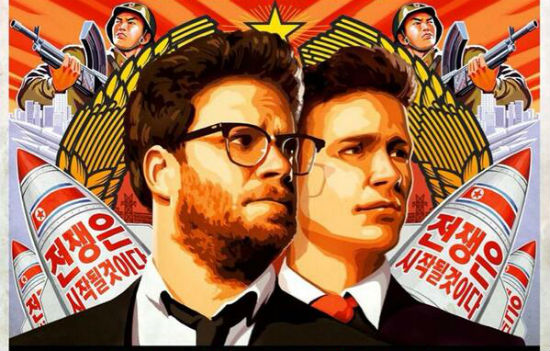 The following interview took place on December 10, 2013, and was conducted by myself and several other journalists.What's the preparation process in the morning to become an evil dictator?RANDALL PARK: Well, a lot. [Laughs] I've been playing him for a few months now so I don't even think about it, but sitting in makeup, eating food, getting my hair trimmed. I don't even think about it at this point, but when I first started I definitely did a lot of ton of research and I watched a lot of The Last King of Scotland [laughs].What do you think of the hair?
The following interview took place on December 10, 2013, and was conducted by myself and several other journalists.What's the preparation process in the morning to become an evil dictator?RANDALL PARK: Well, a lot. [Laughs] I've been playing him for a few months now so I don't even think about it, but sitting in makeup, eating food, getting my hair trimmed. I don't even think about it at this point, but when I first started I definitely did a lot of ton of research and I watched a lot of The Last King of Scotland [laughs].What do you think of the hair?
PARK: I hate it. I hate it, but you know what I have to walk around like this all the time so I wear a beanie, but sometimes I have no choice but to wear my hair and I try to make it look as normal as possible, but no, there's no chance.
Javier Bardem hated his hair for No Country for Old Men.
PARK: That's right, but at least he had something to work with. I don't have anything to work with.
What's that like working with the improvisation and working with Seth?
PARK: It's been so fun. This is the biggest thing I've ever done in terms of size and scope of the role. To be able to play the way they do, it makes it super fun. And to contribute the scenes. They're so open to suggestions on top of that, and jokes, if you feel it just throw it in, they're totally cool with it. And they'll build on it, add to it. It's been really fun and freeing. They're great.
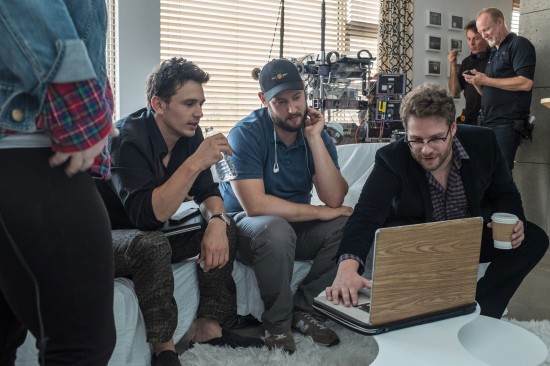 During the audition process did they sort of test you by saying certain things to see how far they could push you?
During the audition process did they sort of test you by saying certain things to see how far they could push you?
PARK: The audition process was interesting. I got the call to come in and I was like, "Okay, where are the sides for the audition?" And they just sent me the script, they told me there are no sides just to go over the script. So I literally went through the whole script trying to learn it, then I went in and just talked to them about the character, what I felt about the character, my views, and it kind of aligned with their views. Then we just literally did every scene in the script. That's all I did. I did one audition and I got it from that one audition.
What were your views on how Kim Jong should be?
PARK: In the original version of the script that I got it wasn't Kim Jong-un. It was actually just this kind of fictional North Korean president, but I was told right before my audition that it was going to be Kim Jong-un. So because it is this real life dictator who's responsible for a lot of crimes against humanity I feel like maybe the tendency for most scripts would be to portray him as evil, almost one-dimensional, because he deserves that kind of treatment – at least in the eyes of many people. But I felt like just as an actor I wanted to give him some layers and portray him as more of a human being, a vulnerable multidimensional human being that just so happens to be responsible for all these horrible things. I think that really was kind of how they were seeing it as well.
Do you think the script makes a statement about how we should feel about the character or does it leave it open?
PARK: I think it does both. I think you definitely get an understanding of this guy and the situation he's in being the son and the grandson – a part of this legacy. And being thrust into this position at a young age, running a country and maybe not being fully prepared. You get an understanding of what he must be going through, but at the same time they definitely nail in the fact that this guy is who he is and has done what he's done and keeps that going. What's going on there. Every day in the news we hear crazy stories about him and those stories are not swept aside in this movie.
Speaking of those stories, when people play a character they tend to become that character even outside of the movie, people are going to think of you as Kim Jong. Did you worry about that?
PARK: Hopefully my hair will have grown out and I will have lost some of the weight I've gained for the part.
How much weight did you gain?
PARK: I gained about fifteen pounds. I had a short period of time to do it though, because originally I was supposed to wear prosthetics for the part and five days before my first shoot day they decided not to go with it. They kind of looked a little weird, especially up close on camera. So they were like, "We're just going to have you play him without the prosthetics, so just eat as much as you can." [Laughs]
What did you eat?
PARK: A lot of donuts. I pretty much ate everything that I like and I've always wanted to eat and I just didn't hold myself back and it was the best [laughs]. It was the best, but I also felt sick. I threw up a couple times.I had a short period of time, but I think you could tell. And then with the help of the makeup department. I have this little help, so hopefully it shows and I look a little more like the real guy than my normal self.
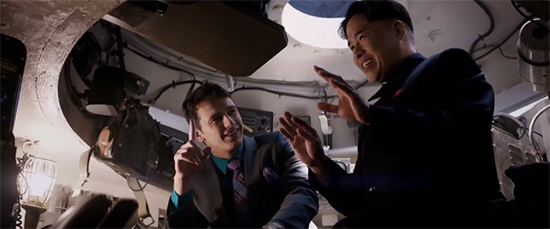 I was impressed watching the monitor because you read your stuff and then they're throwing out lines, but you have to filter those lines through a character. How challenging does that get?
I was impressed watching the monitor because you read your stuff and then they're throwing out lines, but you have to filter those lines through a character. How challenging does that get?
PARK: I really think when they throw out the lines that they don't just throw out jokes for the sake of them being funny, they really throw them out from the perspective of my character, so they're pretty easy to say. Sometimes I may have to reword it a little bit, even with the script just reword things a little bit just to fit the way I feel like I should be speaking as the character, but for the most part it hasn't been an issues.
The scene we just saw – is there a running joke that he might be gay?
PARK: No, but there is – and this is kind of based on the actual Kim Jong Un, but his father gets on his case for being too feminine and calls him gay. It's a source of insecurity for my character, so he's constantly trying to be as manly as possible. He's not gay, but he's so affected by his father and what his father has done to him just psychologically.
So he listens to Katy Perry?
PARK: Yeah, my character loves Katy Perry, but he doesn't want Skylark to know, doesn't want anybody to know, but it turns out everyone loves Katy Perry.
Are there scenes where we really hate him?
PARK: Yeah, yeah, of course. I think especially towards the end when everything falls apart. I mean the movie walks a fine line. You don't want to portray this guy as too sympathetic, but you want to portray him as human. But at a point, yeah, you definitely see the bad side of this guy. It definitely comes out, yeah, especially towards the end. He goes pretty crazy.
What's been the biggest surprise working for Evan and Seth from what you expected going in?
PARK: Just how normal they are, how they're just great guys, just kind of guys who remind me of the kids I hung out with growing up. I didn't expect that. I actually did a small part in Neighbors, which they produced, so I met them on that set. But I only did a couple days on that so I didn't really get to know them and I was super intimidated by them because they're Seth and Evan, you know? But as soon as I started on this film, started to get to know them, I found they're so easy to work with. Also, maybe because we're in Vancouver and this is their home, the set feels like a home. Because it trickles down from the directors, everybody is just so at home here. I think that's a testament to the type of guys they are. They're just real cool guys.
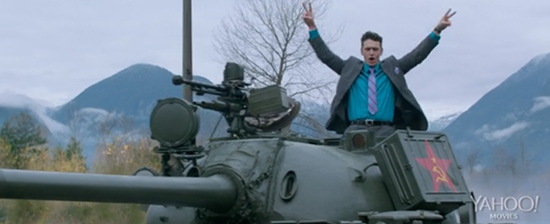 How did you get the role?
How did you get the role?
PARK: I just auditioned for it. I believe Nick Stoller, who directed Neighbors, I worked with him on a movie called Five Year Engagement, and I've worked with him on other things since and from what I understand – I don't know this is all from what I hear from other people – but he really pushed for me, for them to meet me. From what they tell me, and I still don't really believe it [laughs], but from what Evan and Seth tell me I'm the only person who auditioned for this part. Yeah, I just went in and did once and found out the next day that I got it. I still don't believe it really. It's so weird.
Then they told you you have to get a haircut.
PARK: [Laughs] I was like, "I don't care."
What do you think Kim Jong will see if he sees your portrayal of him in this movie?
PARK: I don't know. There's The Great Dictator, Charlie Chaplin did a movie that was him portraying Hitler, just as Hitler's rise to power is about to peak, and Hitler supposedly loved it and could not stop watching this movie even though it was super critical of him [laughs]. I'm not saying I hope that Kim Jong-un loves this, I don't care what he thinks, but I don't know.
Do you care what Dennis Rodman thinks?
PARK: [Laughs] No. I don't care what Dennis Rodman thinks, but there are a few Dennis Rodman references that we kind of improvised into the script. We'll see if they make it in.
From when you first got the script to what you guys are filming, how much changed along the way?
PARK: A lot. I wouldn't say a ton as far as the overall story, but just as far as little things that we've improvised that kind of ended up becoming these things that kind of popped up throughout the movie. Little character things, and from what they told me what I brought to the audition really played a huge part into the development of my character, which was awesome to hear. I guess in the first version of the script I got the character was a little more – well I wouldn't say one-dimensional, but definitely not as fleshed out as it became eventually. Just little things. I wouldn't say it was – definitely not an overhaul of the script. Just subtle things, jokes, and lot of things that just popped up through playing it that eventually made it into the script and affected other scenes so that those scenes would be added. Also just suggestions made from different people, including myself, that eventually became extra scenes that they threw in.
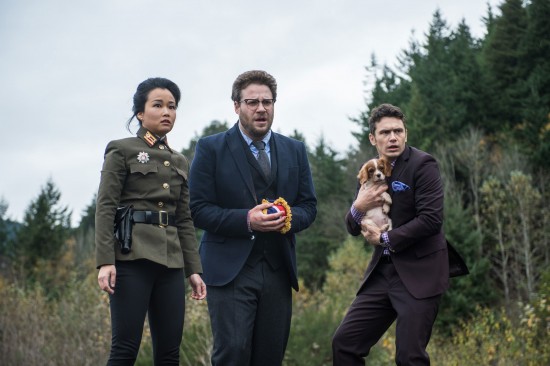 Hollywood has a problem with casting enough or more Asian characters and Asian actors, from your perspective do you find it frustrating that your biggest role to date is as an Asian dictator?
Hollywood has a problem with casting enough or more Asian characters and Asian actors, from your perspective do you find it frustrating that your biggest role to date is as an Asian dictator?
PARK: [Laughs] Yeah, yeah. I'm grateful for this role, and I think it's an awesome role, it's a comedy role and its playing a real person, which I think is super cool, but yeah there are those issues. I read something about the crop for the Oscars how supposedly this is the year of the black actor, but then they're also saying they're all portraying real people. When do we get to play just non-real people?
When do you get to act?
PARK: Yeah, exactly. I can see that across the board with actors of color. There definitely aren't those opportunities to create characters from scratch. But with that being said, I think things are changing and hopefully roles like this can be a stepping stone to show people. There's one stereotype in the industry that Asian people aren't funny, I've heard that over and over again, so opportunities like this get to show people we can be funny and maybe that can lead to other roles that are different. I'm hoping.
Where are your parents from?
PARK: They're from Korea.
The Interview is now in theaters and on demand. Click here to see it.
